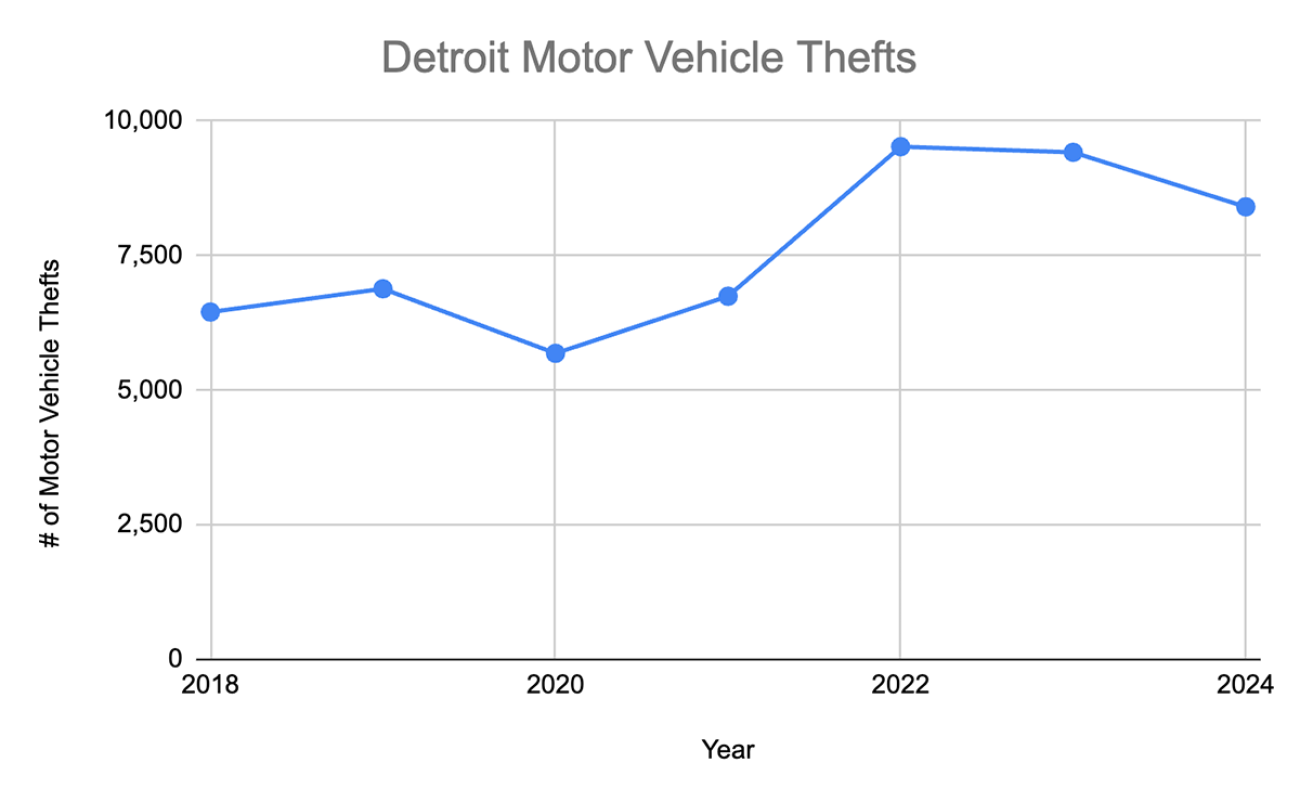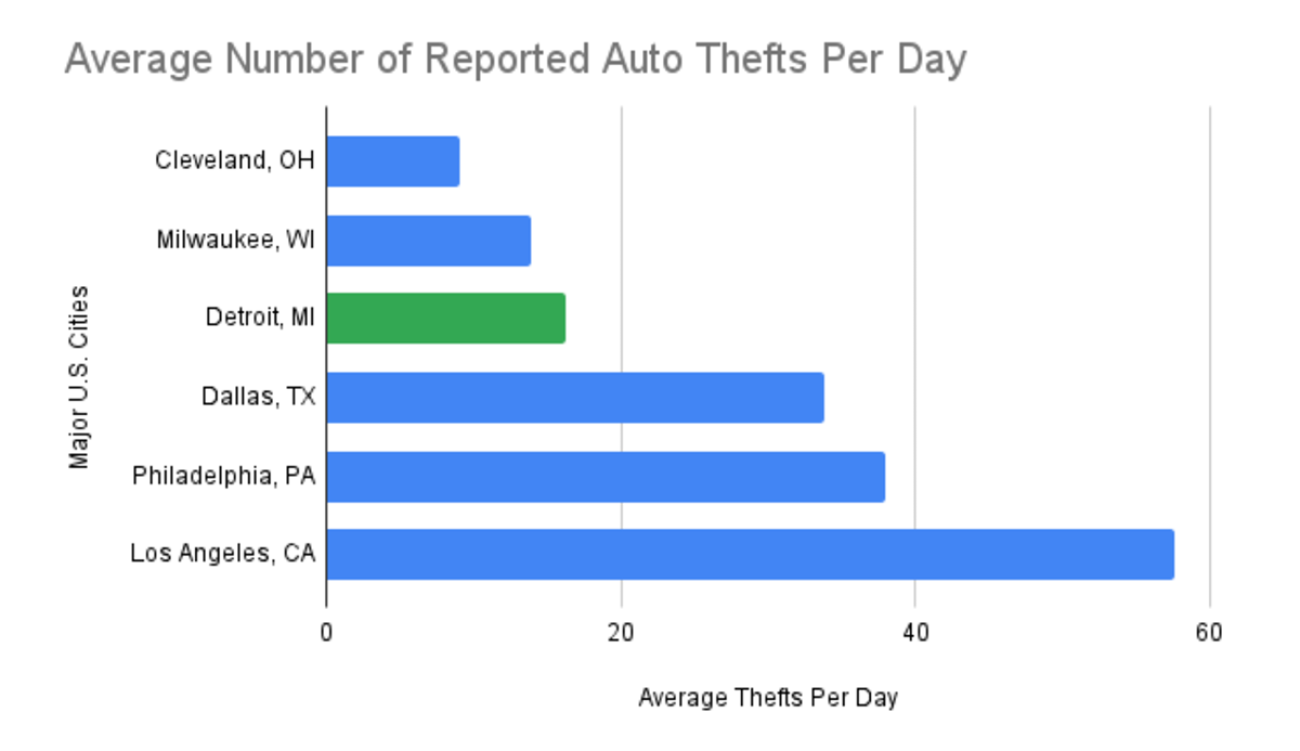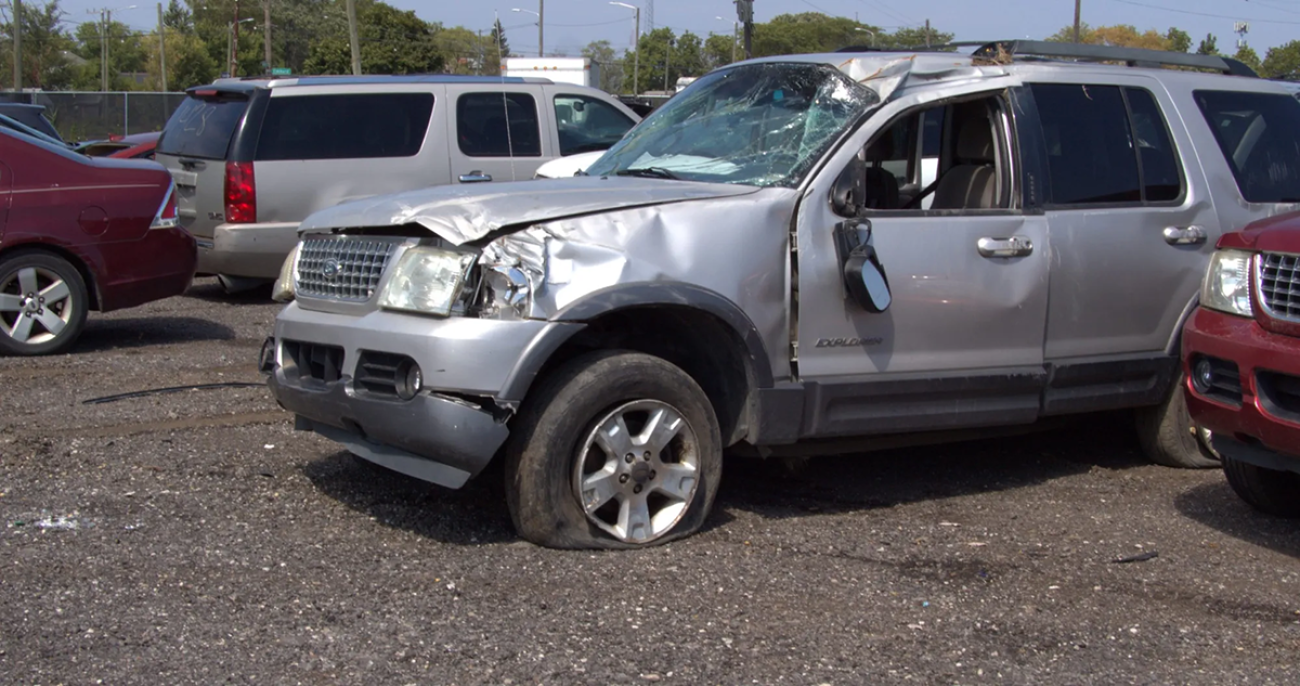Detroit police don’t prioritize auto thefts. Some victims are taking matters into their own hands

This story was published as part of Next City’s Detroit News Hub, a reporting project funded by the Kresge Foundation. The hub includes BridgeDetroit, Planet Detroit and Chalkbeat Detroit.
With little urgency from police after her car was stolen from outside her sister’s New Center apartment complex, Carolyn Brown decided to take matters into her own hands.
The Clarkston resident said she reported the Jan. 24 theft, filed a report at the Detroit Police Department’s 3rd Precinct, and was told to expect a call within a week. But, as she left the station, the navigation system in her 2020 Ford Fusion alerted that her car was moving in the Russell Woods neighborhood near the Highland Park border. Brown tracked down the car – with two busted out driver’s side windows and three men going in and out of it – near Belmont and Oakland Avenue. The discovery, she said, sparked more urgency from police.
“It wasn’t until we went after it ourselves and started calling 911 that they were like, ‘OK stay where you are, we’re gonna come check it out,’” Brown said.
After 30 minutes and no support from law enforcement, she left. Brown said she didn’t necessarily expect an arrest would be made, but was hoping for a police presence to assess and drive away with her car safely.
“It was frustrating that they told us they were gonna come and then didn’t,” she said. “So we kind of just watched the thieves pull away with my car.”

Detroit has celebrated a decline in violent and property crimes in recent years; however, auto thefts remain above pre-pandemic levels and continue to threaten the quality of life for residents and visitors. As frustrations grow, theft victims like Brown are taking action on their own via GPS technology, such as OnStar, or hiding AirTags in their vehicles as precautionary tools to help track down their vehicles in the event of a theft.
Detroit police told BridgeDetroit that stolen vehicle recoveries are typically “low priority” for the department. Most urgent calls for service are tied to the severity of a crime, whether it’s in progress, if there are injuries and other factors, the department said in an emailed statement.

Although the city has seen about 1,000 fewer thefts since 2022, auto theft remains higher than it was in 2018, when Detroit saw 6,454 thefts.
As of May 15, 2,189 auto thefts were reported in Detroit this year, an average of 15 per day. There were about 700 more thefts reported at the same time last year.
Detroit’s auto theft rate is similar to other major U.S. cities like Denver, which has about 80,000 more residents than Detroit, and has seen 2,163 auto thefts as of May 13. Baltimore has about 65,000 fewer residents but slightly more auto thefts than Detroit. Both cities have an average of about 16 thefts per day.
Philadelphia has twice the population of Detroit, and according to the police department’s crime dashboard, it has also reported twice as many auto thefts this year.
DPD has leveraged relationships and technology in recent years to decrease auto theft, Vidaurri told BridgeDetroit, such as partnering with vehicle manufacturers to locate stolen vehicles and distributing steering wheel locks. The department’s Commercial Auto Theft Section (CATS), uses license plate readers to locate and recover stolen vehicles and arrest occupants. CATS also works with other law enforcement agencies to target criminal networks responsible for auto theft in the region.

Detroit would have to decrease the number of reported auto thefts by 2,000 this year to reach 2018 levels.
In the last three months of 2024, Detroit police recovered about as many vehicles as the number reported stolen, the department said in an emailed statement.
According to the city’s 911 data, Detroit police responded to 237 calls for service related to the recovery of stolen vehicles in April, and over 1,000 calls so far this year.
A BridgeDetroit analysis of dispatch audio found that at least 60 of the 237 calls for service in April were related to the recovery of a vehicle located by the owner, and 44 were related to abandoned vehicles. BridgeDetroit was unable to locate dispatch audio for 59 calls for service. For the remaining 74 calls, dispatch didn’t provide details about the circumstances related to the recovery, or the circumstances weren’t related to a stolen vehicle, such as repossession companies requesting police assistance, recovery of construction equipment, or vehicles being returned to rental car companies.
GPS technology increases the likelihood a vehicle will be recovered, but car thieves often take steps to deactivate it, which sometimes results in a false ping, according to DPD. Similarly, a potential downside of using AirTags to locate stolen vehicles is that the devices alert nearby iPhones that an AirTag is in close proximity, and an audible alert will sound to assist with locating it. Although the speaker can be disabled.
Some vehicles don’t get recovered and according to Detroit police, sometimes it’s due to thieves retagging the Vehicle Identification Number (VIN) and shipping the stolen vehicles out of state or out of the country. Inactive GPS tracking subscriptions and delays between pings are also barriers the department faces.
Last fall, the National Insurance Crime Bureau (NICB), a national organization that aims to investigate and deter insurance fraud and crime, partnered with the U.S. Customs and Border Control (CBP) for “Operation Terminus” which sought to prevent stolen vehicles from being smuggled out of the country. It involved inspecting shipping containers to identify high-end vehicles. The partnership resulted in the seizure of multiple vehicles worth millions of dollars, many of which were bound for countries in Africa.
Criminal networks orchestrate the theft and export of stolen vehicles using tactics such as altering VINs, forging documents, and other methods to disguise a vehicle’s origin, which makes it difficult for law enforcement to track them down, according to a Sept. 9 press release. NICB said the organization “disrupted nearly 2,000 organized criminal networks over the past year and recovered more than 300,000 vehicles.”
Treated like a criminal
Zhane Wallace stepped out of her home near 15 Mile and Groesbeck around 10 a.m. on July 5, 2023, to go grocery shopping. Instead, she found that her 2018 Hyundai Tucson was gone.
“I was shocked, of course. I was completely stunned. I never had a car stolen before, so it didn’t cross my mind that it was stolen,” Wallace told BridgeDetroit.
Once the realization hit, Wallace remembered a hidden AirTag in a sock in her glovebox. The app showed a ping six hours prior in the area of Westphalia and Gratiot on Detroit’s east side.
Wallace informed Detroit police, headed there, and said she was told DPD also sent an officer to the location.
In the three hours she spent waiting for an officer to arrive, Wallace said she canvassed for the vehicle, spoke with neighbors, and flagged down Detroit police officers. She says they told her they needed to patrol elsewhere and couldn’t assist her.
The only sign of hope was a neighbor who reported to Wallace that they’d seen the vehicle early that morning at the location it last pinged, which led Wallace to believe her car was parked in the garage.
Officers eventually arrived, and after what Wallace described as 25 minutes of questioning, they went to the back of the house and found her car with the rear passenger window busted out and the ignition cylinder off.
Wallace said officers told her they couldn’t let her drive away with the car. She said she was told that if the tow truck company she called didn’t show up before DPD’s did, a department towing contractor would take it to a tow yard in Romulus.
“So, now I’m irritated because I’m not the person who stole my car,” she recounted.
Vehicles that haven’t been formally reported as stolen but show signs of theft, like a damaged ignition column or a broken window, are considered “partial recoveries” according to DPD’s policy and should be taken to a DPD-authorized impound lot.

According to DPD’s policy for stolen and wanted motor vehicles, officers look for a variety of circumstances to establish probable cause that a vehicle has been stolen, including broken windows, a damaged ignition or steering column, damaged doors and attempts to disguise the appearance of the car, among others.
Detroit police ultimately allowed Wallace to drive her vehicle away from the location after their tow truck driver helped start her Hyundai with a USB cord.
Wallace said that evidence was left in her vehicle, like a hammer, screwdriver, and prescription medication bottles with names on them. However, Detroit police officers told her they wouldn’t check for evidence unless a crime was committed. There was evidence that the car had been stolen, but it had not yet officially been reported as stolen.
Another vehicle was parked in the backyard where Wallace’s Hyundai was recovered. She said she took photos and posted them on social media, hoping to help another potential victim find their stolen vehicle.
“If they (DPD) took the car thefts more serious, they may die down,” Wallace said. “Not taking it seriously when I say, ‘I’m sitting here and I found my car, I just need some assistance for safety, which is your job.’ And they get there and treat you like you’re the criminal who stole the car.”
In Brown’s case, Detroit police last contacted her about her stolen car on Jan. 30. At that time, Brown said, an officer called to find out if she had any updates on the vehicle’s whereabouts.
Brown said she’s among the auto theft victims who have expressed concerns about the police department’s handling of stolen vehicles in a local Facebook group. The group, which has over 50,000 members, is a daily resource for victims who post photographs and information in an attempt to locate stolen vehicles. Victims post stolen vehicle photos and license plate information in hopes of them being spotted, and those with experience navigating the process of recovering a stolen vehicle provide tips and helpful insight.
“I understand not wanting to engage with people if lives aren’t at stake but it’s frustrating the scale at which this seems to be happening to people,” Brown said. “It just seems like a cycle where it’s going to keep happening and people are going to realize there’s nothing being done to stop it, so it’s easy so let’s keep doing it, and that part is frustrating.”
Moderators of the Facebook group did not respond to BridgeDetroit’s requests for an interview.
How other cities are tackling auto theft
Other cities have capitalized on the timing factor in auto theft investigations, and some programs allow vehicle owners to share their vehicle location data with police departments in real time to speed up the recovery process.
“Get it back with DenverTrack” is the slogan for the Denver Police Department’s auto theft prevention initiative, which allows vehicle owners to register factory-installed and aftermarket GPS devices so police can quickly access vehicle location data when a theft is reported.
Under the effort, when a vehicle is stolen, instead of a victim providing multiple updates to police about the location, police can access the location data for vehicles enrolled in the program as soon as a theft is reported. Denver police don’t access the data unless the vehicle is reported stolen.
Enrolled drivers receive window stickers to alert potential car thieves that the vehicle’s location data will be provided to the police. To date, only one vehicle out of about 4,000 enrolled in the program has been stolen, Denver police said during a March press conference, which the department said is evidence the stickers serve as an effective deterrent in auto theft. The program is free for participants.
Lakewood Police Department, also in Colorado, implemented a nearly identical program in 2023 and saw similar results, with only one vehicle being stolen out of the thousands enrolled. The agency’s program was highlighted by the U.S. Federal Bureau of Investigation (FBI) in January as an effective theft prevention and recovery program.
The Detroit Police Department confirmed that it’s looking at programs similar to Lakewood and Denver.
“We are reviewing the (DenverTrack) program to determine if it would be logistically possible to implement in Detroit,” the department said in a statement.
In the meantime, DPD is promoting several steps vehicle owners can take to avoid falling victim to auto theft.
“People should never leave their vehicle running, whether in the driveway warming up, at the gas station while running inside, or in the street while making a door dash delivery – you should always take the extra time to park, take the keys out, and lock the car,” DPD told BridgeDetroit in an emailed statement.
Vehicle Identification Number (VIN) etching, which involves marking the VIN on a window or other vehicle parts, adds “additional disposal steps that many thieves will not want to take the time to alter.”
Anti-theft devices, such as steering wheel locks, OBD port locks, remote battery disconnects, vehicle immobilizers, and GPS trackers, also add an additional layer that can help prevent auto theft or, at the very least, recover a vehicle after it’s stolen.
The National Insurance Crime Bureau recommends a combination of these strategies to create “four layers of protection.” The first involves more common-sense strategies like not leaving keys and other valuables in a car and locking it. Warning devices, like steering wheel locks, are in plain sight and help to deter would-be thieves from attempting to steal a vehicle. Additionally, immobilizing devices that cut off the ignition system so the vehicle is no longer drivable and tracking devices, like Apple AirTags, both assist in recovery.
DPD said victims who have difficulty in getting a timely response through 911 dispatch or who are attempting to locate their vehicle can reach out to the Detroit Police Department’s Commercial Auto Theft Section (CATS) by calling (313) 596-2555 between 8 a.m. and 4 p.m.
See what new members are saying about why they donated to Bridge Michigan:
- “In order for this information to be accurate and unbiased it must be underwritten by its readers, not by special interests.” - Larry S.
- “Not many other media sources report on the topics Bridge does.” - Susan B.
- “Your journalism is outstanding and rare these days.” - Mark S.
If you want to ensure the future of nonpartisan, nonprofit Michigan journalism, please become a member today. You, too, will be asked why you donated and maybe we'll feature your quote next time!




